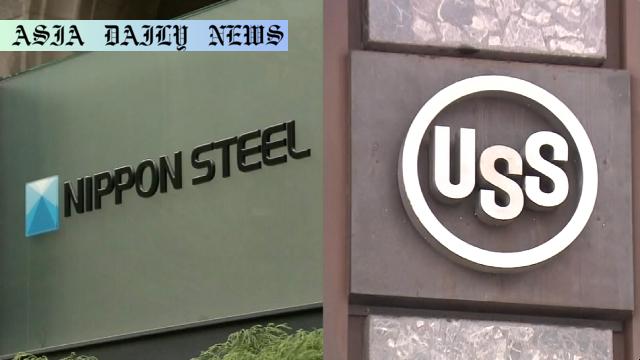US Steel-Nippon Steel Partnership: A transformative deal creating 70,000 jobs and adding $14B to the U.S. economy.
- Key Point 1: U.S. President Trump approves a powerful partnership between US Steel and Nippon Steel.
- Key Point 2: The deal is estimated to generate 70,000 jobs and add $14 billion to the U.S. economy.
- Key Point 3: Nippon Steel remains cautious as the full approval regarding turning US Steel into a subsidiary is yet unknown.

Trump Announces Landmark Partnership Between US Steel and Nippon Steel
In a significant development for the American steel sector, U.S. President Donald Trump revealed a “planned partnership” between United States Steel Corporation (US Steel) and Japan’s Nippon Steel. This partnership, as detailed through a social media post by Trump, is expected to shape the future of the U.S. steel and manufacturing industries while bringing vast economic benefits and job creation to the country.
Economic Impact: Jobs and Growth
The announcement highlighted that this groundbreaking partnership would create over 70,000 jobs while contributing a remarkable $14 billion to the U.S. economy. Trump’s post emphasized the deal as a win for American workers and industries, reinforcing that US Steel’s headquarters will remain firmly located in Pittsburgh, Pennsylvania, a city with deep roots in the steel manufacturing sector.
Job creation and economic growth on such a scale bring optimism for revitalization within the steel industry. Additionally, these developments foster hope for a renewal in manufacturing hubs across the United States, underscoring the positive economic ripple effect expected to arise through this partnership.
Uncertainty Over Ownership Details
However, not all details have been clarified. A critical point under observation is the level of ownership Nippon Steel will have in this strategic deal. Currently, it remains unclear whether President Trump will approve Nippon Steel’s intended plan to make US Steel its wholly-owned subsidiary. While the Japanese firm has applauded Trump’s support for the partnership itself, the lack of clarity surrounding control and shares poses questions about the final structure of the deal.
Observers and industry specialists are paying close attention to the direction of negotiations, especially concerning stakeholder interests and potential differences in management styles between the two companies. Both sides recognize that the deal would serve as a turning point for US Steel and its associates, though concerns on ownership and governance still loom large.
The Strategic Importance of the Deal
This partnership holds wider strategic importance for the United States. Strengthening alliances with Japan through Nippon Steel not only bolsters economic ties but also cements partnerships in industries critical for national infrastructure. The steel and manufacturing sectors play pivotal roles in the American economy, making collaborations like these a key building block for the nation’s growth strategy.
Additionally, the deal underlines the importance of foreign investments in the U.S. economy, signaling a shift to integrate global expertise while preserving U.S. jobs and industry interests. It also enhances technological exchange and resource sharing between the two countries, setting a precedent for similar arrangements in other sectors.
Future Implications
While the partnership opens opportunities, there are considerations to be addressed. What degree of influence the Japanese firm will ultimately gain over US Steel, how local stakeholders respond, and the long-term compatibility of this partnership will all play a role in shaping its success.
The deal comes at a time when trade relations and strategic partnerships are being redefined on the global stage. As Nippon Steel ventures into the U.S. market with greater involvement, it reflects a broader trend of Japanese firms investing in the United States, reflecting mutual benefits in economics and diplomacy alike.
Conclusion
The planned partnership between US Steel and Nippon Steel emerges as a monumental alliance aimed at economic growth, job creation, and industrial renewal. Its ultimate form, particularly concerning ownership, will define not just the partnership’s structure but also its influence on the broader American market. Trump’s announcement signals a forward-looking approach to fostering industrial strength and revitalizing the U.S. steel narrative in a competitive global environment.



Commentary
Embracing Global Industrial Collaboration
The planned partnership between US Steel and Nippon Steel arrives at a pivotal moment for the U.S. economy and global trade. This initiative highlights the potential of international collaborations to bolster domestic industries while bringing in much-needed foreign investments. Over the years, steel manufacturing in the U.S. has seen varied challenges, including market competition, trade wars, and fluctuating demand. This deal symbolizes how thoughtful alliances can revive industries, expand job opportunities, and fuel economic expansion.
Balancing Economic Interests and Sovereignty
While the potential impact of this partnership is immense, questions regarding governance and ownership structure underline the delicate balance required in such agreements. Retaining U.S. Steel’s autonomy while integrating Nippon Steel’s expertise offers an ideal middle ground, but pushing too far on either side could raise sensitive debates about economic sovereignty and foreign interference. Trump’s cautious stance on limiting Nippon Steel’s ownership exhibits awareness of these dynamics, which could have both political and economic ramifications.
Path Towards Industrial Renewal
This partnership not only signals economic growth but also fosters innovation and adaptation in the U.S. manufacturing domain. To remain competitive in the global steel market, leveraging technology, resources, and expertise from global leaders like Nippon Steel is imperative. Such collaborations also pave the way for further technological advancements and production efficiency, ultimately benefiting all stakeholders.
Ambitions Beyond Steel
Finally, this deal may serve as a blueprint for similar international collaborations across other industries. By showcasing the benefits of strategic partnerships and economic integration, the US Steel-Nippon Steel agreement hints at a broader trend of interconnected economies fostering mutual growth. Policymakers, industries, and investors alike should view this as an opportunity to redefine approaches towards sustainability and competitiveness in manufacturing and trade sectors.
Overall, while questions remain, the transformative potential of this union is undeniable, promising a brighter future for U.S. Steel and the nation’s economic landscape.